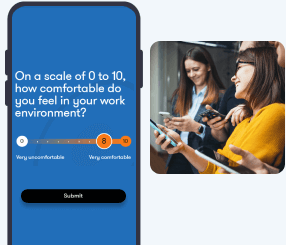Cognitive overload is a common phenomenon in today’s fast-paced work environments where employees are bombarded with vast amounts of information and tasks to handle. It can be defined as the point at which the working memory becomes overwhelmed with too much information, leading to a decrease in productivity and performance.
Use this guide to dive into the causes and effects of cognitive overload, identify examples, and discover solutions to help employees overcome it.
What is cognitive overload?
Cognitive overload is a state of mental exhaustion that occurs when the demands placed on working memory exceed its capacity. Working memory is the part of the brain that holds and manipulates information temporarily while performing cognitive tasks. When the amount of information exceeds the capacity of working memory, it can result in decreased performance, difficulty concentrating, and other negative outcomes.
In a professional setting, cognitive overload can occur when employees are required to manage multiple tasks, responsibilities, or projects at the same time. It’s especially common for employees who work in high-pressure or fast-paced environments, such as healthcare, customer service, or emergency services.
Cognitive overload can also occur when employees are learning new, complex skills, or working with unfamiliar technology or systems. Managing cognitive overload is crucial when you are onboarding new hires, or delivering training on new skills or processes.
What is the primary cause of cognitive overload?
The primary cause of cognitive overload is an excessive amount of information or demands placed on working memory. This can occur when employees are required to manage multiple tasks simultaneously, process complex information, or work with unfamiliar technology or systems.
Cognitive overload can also occur when employees are required to work for long periods without breaks or when they are under significant stress or pressure.
These four main causes can be broken down to the following:
- Multitasking
Contrary to popular belief, multitasking isn’t always a smart way of working, and is actually a significant cause of cognitive overload. Trying to complete multiple tasks at once can lead to decreased productivity, as the brain struggles to switch between tasks. - Information overload
Employees are continually bombarded with vast amounts of information through emails, social media, and other digital channels. Trying to process all this information can lead to cognitive overload. - Poor time management
Employees who struggle with time management might procrastinate important tasks, leading to a situation where employees have too much to do in a limited amount of time. - Complex tasks
Complex tasks that require a lot of cognitive resources can lead to cognitive overload if employees are not adequately trained to handle them.
What are the effects of cognitive overload?
Cognitive overload can have various negative effects on employees and the workplace, including:
- Decreased productivity
While different employees will have different capacities for how many responsibilities they can handle, every employee has a breaking point where their productivity declines due to having too many projects to execute. - Burnout
Continual cognitive overload can lead to burnout, a state of physical, emotional, and mental exhaustion that can result in decreased job satisfaction and motivation. - Poor decision making
When there are too many moving parts and not enough time to consider options, it’s only natural that employees might end up making poor decisions on the spot as a result of cognitive overload.
What does cognitive overload look like?
Cognitive overload symptoms can vary depending on the individual and the situation. However, some common signs include:
- Difficulty concentrating
Employees may have difficulty focusing on tasks due to the amount of information or demands placed on working memory. - Forgetfulness
When employees have too many things to remember simultaneously, it’s inevitable that they may forget important details or deadlines. - Feeling overwhelmed or anxious
Stress is a natural response to cognitive overload, and it’s important that managers help employees manage their workload to prevent turnover in the company.
Cognitive overload can occur in any workplace, but it can be especially challenging in deskless industries where employees have the added element of physically being on their feet and on the move throughout the workday. Some specific examples of cognitive overload on the job include:
- Healthcare: Nurses and doctors in busy hospitals may be required to manage multiple patients simultaneously, process complex medical information, and make critical decisions under pressure.
- Retail: Customer service representatives in busy stores may be required to assist multiple customers simultaneously, process complex transactions, and manage inventory.
- Manufacturing: Operating complex machinery and having the added pressure to meet production requirements on time can easily lead to cognitive overload and stress in the workplace.
- Shipping and transportation: Delivery drivers often have intense delivery schedules and are under pressure to meet customer expectations, especially during high demand seasons.
How do you overcome cognitive overload?
Every job comes with its stress and it’s important for employers to have realistic expectations and create processes that run as smoothly and efficiently as possible. Leaders in the company have a responsibility to eliminate roadblocks and support employees in their day to day. They can help prevent cognitive overload for their teams by:
- Prioritizing and simplifying tasks: When assigning tasks to employees, managers should provide clear priorities, as well as break down tasks into reasonable steps and milestones. By providing smaller, specific objectives large projects will appear much more accomplishable, and less daunting.
- Allowing for regular breaks: Encouraging employees to take short breaks a few times a day can help dramatically reduce stress levels. Even better if physical activity or relaxation techniques are incorporated into these breaks.
- Leveraging microlearning: When you have new information to present, consider taking a microlearning approach and breaking down your content into smaller, bite sized pieces that are easier to comprehend and remember.
- Providing support and resources: Creating a supportive and healthy work environment goes a long way in reducing stress and cognitive overload. This can include time management tools, access to training and development opportunities, and regular check-ins to ensure employees are not overwhelmed.
Help employees fight cognitive overload with a powerful microlearning app

FAQs
What are signs of cognitive overload?
The signs of cognitive overload include difficulty concentrating, poor decision making, forgetfulness, fatigue, and decreased productivity. If employees begin to experience these it means they need support to help ease their workload.
What are the 3 types of cognitive load?
The three types of cognitive load are:
- intrinsic load (the inherent difficulty of the task)
- extraneous load (the demands placed on working memory)
- germane load (the mental effort required to understand and learn new information)
How do you fix cognitive overload?
Cognitive overload can be fixed by simplifying and streamlining tasks, providing regular breaks, using microlearning or bite sized training, and providing support and resources to manage workloads effectively.
Taking a load off to fight cognitive overload
Cognitive overload is a common issue that affects productivity and can lead to burnout in the workplace. It is caused by an excessive amount of mental demands that exceed the capacity of working memory. By taking proactive steps to manage cognitive overload, such as managing employee workloads, encouraging regular breaks, and breaking down information into bite sized learning, companies can create a more productive and healthy work environment for their employees.
Key takeaways
- Cognitive overload is a state of mental exhaustion caused by excessive demands on working memory.
- In the workplace, cognitive overload can lead to decreased productivity, burnout, and other negative outcomes affecting both the employee and their employer.
- Managers can help employees overcome cognitive overload by prioritizing and simplifying tasks, providing regular breaks, using microlearning, and providing necessary support and resources.
- The three types of cognitive overload are: intrinsic load, extraneous load, and germane load.
- By addressing cognitive overload in the workplace, companies can create a more productive and healthy work environment for their employees.


